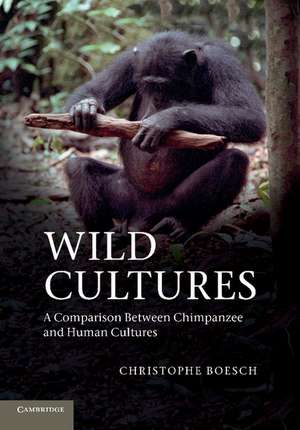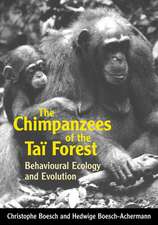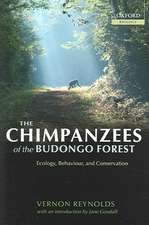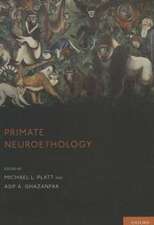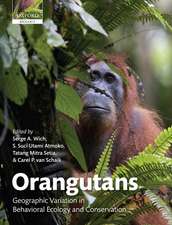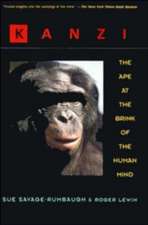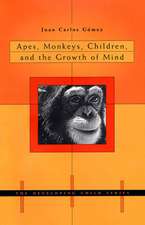Wild Cultures: A Comparison between Chimpanzee and Human Cultures
Autor Christophe Boeschen Limba Engleză Paperback – 19 feb 2014
| Toate formatele și edițiile | Preț | Express |
|---|---|---|
| Paperback (1) | 369.97 lei 6-8 săpt. | |
| Cambridge University Press – 19 feb 2014 | 369.97 lei 6-8 săpt. | |
| Hardback (1) | 499.20 lei 6-8 săpt. | |
| Cambridge University Press – 5 sep 2012 | 499.20 lei 6-8 săpt. |
Preț: 369.97 lei
Nou
Puncte Express: 555
Preț estimativ în valută:
70.80€ • 73.65$ • 58.45£
70.80€ • 73.65$ • 58.45£
Carte tipărită la comandă
Livrare economică 14-28 aprilie
Preluare comenzi: 021 569.72.76
Specificații
ISBN-13: 9781107689152
ISBN-10: 1107689155
Pagini: 292
Ilustrații: 68 b/w illus. 11 tables
Dimensiuni: 170 x 244 x 16 mm
Greutate: 0.47 kg
Editura: Cambridge University Press
Colecția Cambridge University Press
Locul publicării:New York, United States
ISBN-10: 1107689155
Pagini: 292
Ilustrații: 68 b/w illus. 11 tables
Dimensiuni: 170 x 244 x 16 mm
Greutate: 0.47 kg
Editura: Cambridge University Press
Colecția Cambridge University Press
Locul publicării:New York, United States
Cuprins
Introduction; 1. Studying culture in the wild; 2. From human culture to wild culture; 3. Shaping nature into home: about material culture; 4. One for all and all for one: about social culture; 5. I want to have sex with you: about symbolic culture; 6. Learning culture: from pupils to teachers; 7. Dead or alive? Towards a notion of death and empathy; 8. Wild culture - wild intelligence; 9. Uniquely chimpanzee - uniquely human; Epilogue: will we have the time to study chimpanzee culture?; References; Index.
Recenzii
'We have long been searching for the key to answering the question: 'What makes us human?' In this fascinating and engaging book, Boesch asks if the answer is 'Culture' … [He] synthesizes current knowledge of the psychology of wild and captive chimpanzees with current knowledge of the psychology of humans from diverse cultures. We arrive at a compelling new understanding of the diversity and influence of 'wild cultures', and only realize afterward that Boesch has taught us about following the scientific path to address such comparative questions. This path is important, in part, because there is still much that we do not know, and investigations in the wild are needed urgently … Boesch has provided my developmental comparative psychology students, lay people, and chimpanzee enthusiasts with greater insight into what makes us human, and what makes chimpanzees uniquely themselves.' Kim A. Bard, Director, Centre for Comparative and Evolutionary Psychology, University of Portsmouth
'A sustained and compelling argument for the ethnography of animal societies. With simple logic, decades of ethological data, and many well-chosen examples, Boesch masterfully skewers numerous recent claims of human uniqueness by 'hardcore experimental psychologists': contrary to theoretical fashions, chimpanzees cooperate, display altruistic behaviour, invent symbols, and adhere to cultural conventions; none of these are uniquely human characteristics. Better than any other single source, Boesch analyses the deep causes of apparently divergent findings from the laboratory and the wild - nobody interested in comparative cognition should ignore this book … This is a frank, balanced evaluation of studies with apes, both in the wild and in captivity. Theoretical dogmas are shattered against the rocks of his decades of systematic data on wild chimpanzees … Should be required reading for every philosopher and experimental psychologist, and will enrich anybody interested in culture, cognition, and chimpanzees.' David A. Leavens, University of Sussex
'It is hard to imagine a better guide to chimpanzee culture than Christophe Boesch, who for decades has followed these apes in the tropical forest. The author lays out the culture question in all of its richness without any of the anthropocentrism usually surrounding this issue. The result is a highly satisfactory firsthand account of how wild chimpanzees shape their own environment and society.' Frans de Waal, author of The Age of Empathy
'What makes us human? This book could force a rethink.' Nature
'Remarkable findings …' The Times Literary Supplement
'This work serves as a comprehensive chimpanzee ethnography that focuses on the increasing diversity of cultural behaviors observed and reported among chimpanzee populations; these, in turn, then become the basis for comparison with, and evaluation of, human culture. This well-written, well-documented book is a significant contribution to evolutionary anthropology. Highly recommended.' R. A. Delgado, Jr, Choice
'… this book should be read for its rich ethnography of our fascinating near evolutionary cousin.' The Quarterly Review of Botany
'This elegantly written book is a must-read for anyone who teaches or studies 'what makes us human'.' Folia Primatologica
'A sustained and compelling argument for the ethnography of animal societies. With simple logic, decades of ethological data, and many well-chosen examples, Boesch masterfully skewers numerous recent claims of human uniqueness by 'hardcore experimental psychologists': contrary to theoretical fashions, chimpanzees cooperate, display altruistic behaviour, invent symbols, and adhere to cultural conventions; none of these are uniquely human characteristics. Better than any other single source, Boesch analyses the deep causes of apparently divergent findings from the laboratory and the wild - nobody interested in comparative cognition should ignore this book … This is a frank, balanced evaluation of studies with apes, both in the wild and in captivity. Theoretical dogmas are shattered against the rocks of his decades of systematic data on wild chimpanzees … Should be required reading for every philosopher and experimental psychologist, and will enrich anybody interested in culture, cognition, and chimpanzees.' David A. Leavens, University of Sussex
'It is hard to imagine a better guide to chimpanzee culture than Christophe Boesch, who for decades has followed these apes in the tropical forest. The author lays out the culture question in all of its richness without any of the anthropocentrism usually surrounding this issue. The result is a highly satisfactory firsthand account of how wild chimpanzees shape their own environment and society.' Frans de Waal, author of The Age of Empathy
'What makes us human? This book could force a rethink.' Nature
'Remarkable findings …' The Times Literary Supplement
'This work serves as a comprehensive chimpanzee ethnography that focuses on the increasing diversity of cultural behaviors observed and reported among chimpanzee populations; these, in turn, then become the basis for comparison with, and evaluation of, human culture. This well-written, well-documented book is a significant contribution to evolutionary anthropology. Highly recommended.' R. A. Delgado, Jr, Choice
'… this book should be read for its rich ethnography of our fascinating near evolutionary cousin.' The Quarterly Review of Botany
'This elegantly written book is a must-read for anyone who teaches or studies 'what makes us human'.' Folia Primatologica
Notă biografică
Descriere
A journey into the lives of chimpanzees, revealing the many parallels and differences between us.
